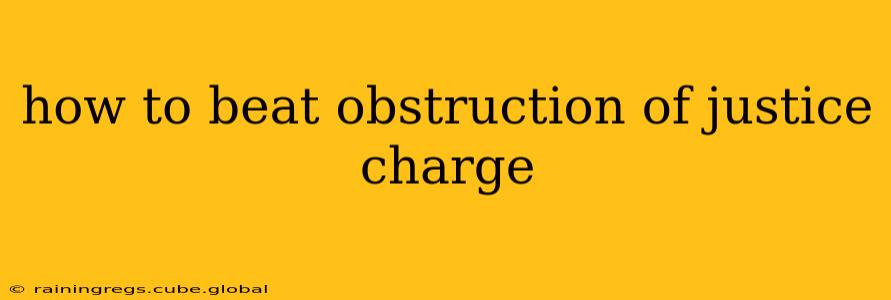Facing an obstruction of justice charge is incredibly serious. These charges carry significant penalties, including hefty fines and lengthy prison sentences. Successfully defending against such a charge requires a multifaceted approach, beginning with a thorough understanding of the offense itself and the nuances of legal strategy. This guide offers insights into navigating this complex legal landscape, but remember: this is not a substitute for legal counsel. You must consult with a qualified criminal defense attorney immediately if you are facing these charges.
What Constitutes Obstruction of Justice?
Obstruction of justice is a broad term encompassing various actions aimed at interfering with the administration of law. These actions can range from relatively minor offenses to serious felonies, depending on the specific circumstances and the intent behind the actions. Common examples include:
- Witness tampering: This includes intimidating, threatening, or otherwise influencing witnesses to alter their testimony or refuse to cooperate with investigators.
- Destruction of evidence: Intentionally destroying, concealing, or altering evidence relevant to a criminal investigation constitutes obstruction.
- False statements: Providing false information to law enforcement or a court of law is a serious form of obstruction. This also includes perjury, which is lying under oath.
- Fabricating evidence: Creating false evidence to support a case or undermine a prosecution is a significant offense.
- Hindering apprehension: Actively working to prevent the arrest or detention of someone suspected of a crime.
How Can I Build a Strong Defense Against Obstruction of Justice Charges?
A successful defense hinges on several key strategies:
- Early Legal Counsel: Contacting an experienced criminal defense attorney as soon as possible is crucial. They can advise you on your rights and help protect you from self-incrimination. The attorney will also immediately begin investigating the circumstances surrounding the accusations.
- Challenging the Evidence: Your lawyer will scrutinize the evidence presented by the prosecution. This could involve questioning the legality of the evidence obtained (e.g., illegal search and seizure), its authenticity, or its relevance to the alleged obstruction.
- Establishing Lack of Intent: A critical element in many obstruction cases is proving a lack of intent to obstruct justice. Your attorney will work to demonstrate that your actions were unintentional or had an innocent explanation.
- Demonstrating Lack of Knowledge: If you were unaware of the ongoing investigation or the relevance of your actions to a criminal case, your attorney can argue that you lacked the knowledge necessary to be guilty of obstruction.
- Negotiating a Plea Bargain: In some cases, a plea bargain may be a viable option to mitigate potential penalties. However, this should only be considered after carefully weighing the risks and benefits with your attorney.
What are the potential penalties for obstruction of justice?
Penalties vary greatly depending on the severity of the offense, the jurisdiction, and the defendant's criminal history. They can range from probation and fines to lengthy prison sentences and a criminal record that can significantly impact your future.
What if I'm accused of obstruction, but I didn't do anything wrong?
This is where experienced legal counsel is paramount. Your attorney will thoroughly investigate the facts, build a strong defense based on your innocence, and aggressively represent you in court.
How can I avoid obstruction of justice charges?
The best way to avoid these charges is to cooperate fully with law enforcement investigations (within the boundaries of your rights), to be truthful in your statements, and to avoid any actions that could be construed as an attempt to interfere with the legal process. Remember, even seemingly small actions can have significant legal consequences.
What is the difference between obstruction of justice and contempt of court?
While both involve interference with the legal process, obstruction of justice is a broader term that applies to actions outside of a courtroom setting. Contempt of court, on the other hand, specifically refers to actions that disrupt the proceedings of a court.
Remember, this information is for educational purposes only and does not constitute legal advice. If you are facing an obstruction of justice charge, seek the immediate assistance of a qualified criminal defense attorney. They are your best resource in navigating this complex and potentially life-altering situation.
